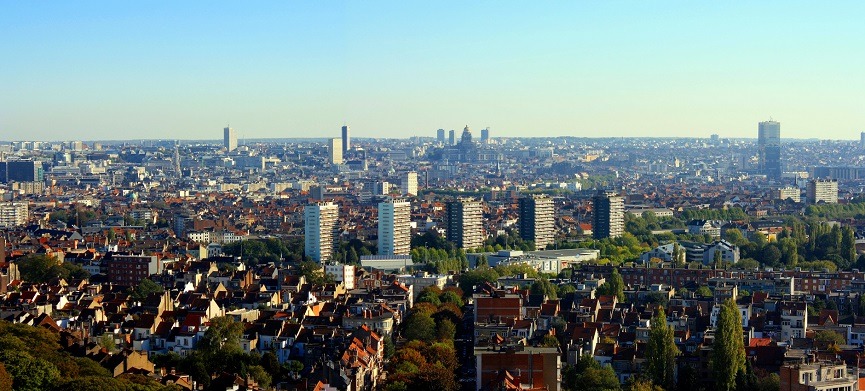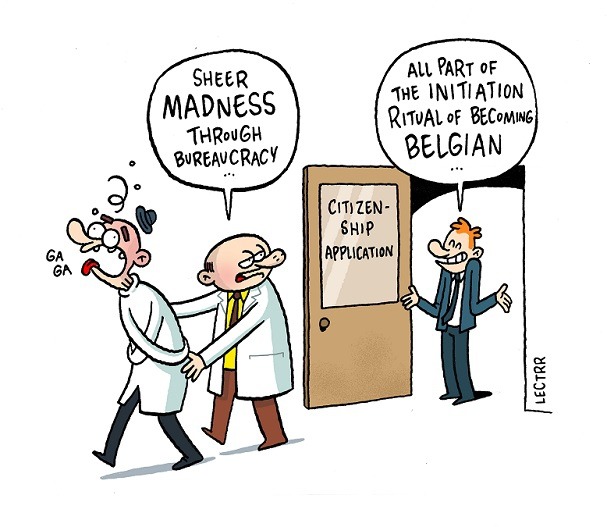23 June 2016 will go down in history as the day the majority of British citizens voted to leave the European Union. About nine months later, on 29 March 2017, the British government formally notified the European Council about its intention to leave the Union. This set in motion a two-year process of negotiations between the UK and the EU to iron out the terms of the exit and the UK's future relationship with the EU.
One of the first tasks – well before 2019 when Britain formally quits – should be to ease the anxieties of the many EU citizens who live in the UK, and the Brits who have made their lives abroad, including Belgium. For people with families, jobs, and businesses, there is an obvious desire to know what happens next.
The Brussels Times spoke with British expats living in Belgium on why they decided to take the plunge and apply for the nationality of their adopted “homeland” and, in doing so, sometimes giving up their British nationality, although dual citizenship is allowed.
James Wilson, who lives with his family in Tervuren, has worked in Belgium for many years and explained why he decided to “opt in” to the EU. He said he was “delighted” to receive confirmation from his local commune notifying him that his application to become a Belgian citizen had been approved.
He said this will allow him to continue to “enjoy the freedoms of an EU citizen and to promote the rights and values that I share with my fellow citizens of Belgium and the EU.” He adds, “Of course, I opened a bottle of fine Belgian beer to celebrate.”
He went on, “I have lived here and paid my taxes in Belgium longer than anywhere else in the world; in return, this country has been generous enough to give me a home where I have brought up and educated my family, and where I have developed my own uniquely Belgian business. I therefore naturally have a fond affection for Belgium.”
Wilson said, “Our family feels welcome and at home here. We are a typical multilingual family in Brussels, speaking three or four languages with ties to different EU member states, and who all have a strong attachment to the community that has helped us to settle in our adoptive country.”
While “disappointed” by the future direction that the UK Government has decided to take – he calls it “a strategic mistake” – Wilson said, “This in no way detracts from my historical loyalties to the UK. I am not guided by the narrow-minded isolationist and selfish doctrines of nationalism. I am guided by international ideas and principles. I am first and foremost a European, but remain also proudly Scottish, British, and now Belgian, with international loyalties to the principles that I hold dear.”
He is, nevertheless, “happy that the European values and rights on offer to the citizens of Belgium are exactly those which I am very proud to share and to promote. I shall remain loyal to them.”
Matt Williams, a British citizen who has obtained Belgian nationality after 10 years of living and working in the country, said, “For me, obtaining Belgian nationality allows me to preserve the privilege as an EU citizen to live and work within the EU. There is still so much uncertainty around the questions of reciprocal rights for EU and British citizens and what will happen post-Brexit.”
He continued: “Belgium is an inclusive, welcoming place, and this was reflected in the ease with which I was able to acquire Belgian citizenship. For me and my family this is a huge relief and means that we can continue to enjoy life in Belgium and all that this wonderful country has to offer.”

Belgium is receiving hundreds of requests from British nationals keen to get Belgian citizenship. There are currently an estimated 24,000 British expats currently living in Belgium with about a third residing in Brussels.
For some, though, the experience of applying for Belgian nationality has proven to be less wonderful. Several of the people contacted by The Brussels Times complained about the procedure, including Rebecca Taylor, a consultant in Brussels, who blamed the “Belgian culture and general attitude towards foreigners.”
She said the Belgian civil servants she had dealt with appeared “uninformed and unhelpful”, adding, “I was repeatedly told that something was missing and was sent away. To be honest, in the end I gave up. The experience has been something of a nightmare I am afraid. I will just have to see how things pan out in the coming months and years but, given the current situation, it is all very worrying.”
James Kanter, a British subject and a correspondent reporting on European Union affairs from the Belgian capital, said, “I’m actually loving learning Dutch for my integration exam although it’s odd there’s no equivalent exam available in French in Brussels since it's a heavily francophone city."
James has been resident in Belgium since 2009 and has paid income tax to the Belgian state since then. But to qualify for Belgian nationality he still must prove his “integration” because he can only certify four years of social security payments in Belgium rather than the required five years.
Briton Amy Parsons has, so far, made several unsuccessful attempts to take out nationality and says, "I can either choose to fight it via legal channels, or wait until June 2019. The latter makes me rather nervous – who knows what my status will be then, post-Brexit? Will Belgian citizenship requirements change in the meantime?”
Amy, who moved here in 2006 and lives in St Gilles, added: "To add insult to injury, I will need a birth certificate to apply. I recently went through hell and high water to get official copies from Zimbabwe in order to get married here.”
“Unfortunately, the commune tells me, these must be recent (i.e. issued within the past 6-12 months) at the time of application. So, unless I can apply before this November, I will have to spend a few months and hundreds of euro obtaining new official copies, despite the fact that I already have three.”
Amy, an events manager for an EU industry association, added, "It is all very frustrating. Sometimes I think it'll be fine in the end, they won't leave us Brits high and dry, and there will be a solution.”
“But then I look at the UK government, and the hash they are making of negotiations even at this early stage, and I am profoundly uneasy. I want to remain an EU citizen and it makes sense to me to do that by getting citizenship of the country I have lived in for 11 years."
British writer James Drew, who has also been based in Brussels for some years, said, “I have four years left on my UK passport and, as my grandfather was Irish, I can apply for an Irish passport. That will probably be the way I go, but, as the years pass, Belgian nationality will probably become more and more attractive.”
Briton Colin Moors has been in Belgium for some 18 years and says the Brexit referendum result was “definitely” his motivation for seeking Belgian nationality.
He said, “The thought of no longer being European annoys and upsets me. I chose this existence and someone else has taken it away from me. As for being Belgian, I don't really have much affinity with flags, so taking another nationality didn't worry me any. Would I have given up my British passport to be Belgian? Yes, definitely.”
He describes the naturalisation process as “very Belgian” adding, “The amount of paperwork (and translations) required is probably what you'd expect, had you lived here a while but for a newbie could appear daunting. I think the big issue is that there is no cohesion and the various communes will all tell you different things.”
“Once I returned with a translated copy of the birth certificate, they told me the certificate from my health insurance was out of date by two days and that there was nothing they could do. So it was semi-Kafkaesque, more irksome than anything.”
And the advantages at the end of it all? Colin says, “Free movement around Europe and Schengen, the possibility to go and live in the house I bought in France to name but two.”
Another expat Brit, Chris Jones, who works in the EU, is also among those who are currently still considering whether to opt for Belgian nationality. In his case, there are additional complications as he explained: “As I'm an EU official I have to wait ten years before I can apply which means I've got a few more years to wait.”
So, for those who successfully complete the naturalisation process, what will the “benefits” be at the end of the exercise?
Samantha Davies, originally from Birmingham who has lived and worked as a translator and interpreter in Brussels for 16 years, said, “Well, one obvious advantage is the unrestricted travel. I successfully applied for Belgian nationality and that means I can move about the EU unhindered and search for a job anywhere in the EU.”
Samantha, who has three teenage children, added, “Yes, there was a certain sadness in sort of relinquishing my “Britishness”, albeit because of the result of the referendum, when I became a Belgian national. I have not given up my British passport of course and still, in the main, feel British.”
“But, in acquiring Belgian nationality, I can take advantage of the perks given to all Belgian people. So, yes, I have to admit that I have done this because of the practical advantages and not for any massive love of Belgium.”
| The application process For those Brits (and other nationals) seeking Belgian nationality, here’s a brief summary of what you may be expected to do. To be able to gain Belgian nationality, either by marriage, long-term stay or birth, the required length of residency on Belgian territory has been increased to a minimum of 5 years of lawful residence in the country. There are also conditions related to integration, which vary depending on situations. In order to obtain nationality, one has to prove the following: * Knowledge of at least one of the three national languages; * Social integration through a diploma, training session or professional experience; * If the person has not yet lived legally in Belgium for 10 years, economic participation through work (minimum 468 days) or through payment of social security contributions (minimum 6 trimesters); * If the person has lived in Belgium for over 10 years, participation in community life; * Specific sets of rules exist for spouses of Belgians, retired persons, persons with a handicap; * The legislation also defines “serious personal facts”, which can be a conviction for fiscal fraud or previous participation in a movement or association that is deemed a threat to state security, which can be an obstacle to gaining Belgian citizenship; The application for Belgian nationality is made at the commune city hall, and the administrative fee is €150. The Civil State Officer has the right to refuse the application if he deems that the legal prerequisites have not been satisfied. For applicants who are turned down there is still hope however: it is possible to contest the decision rejecting the application for nationality. |
By Martin Banks

